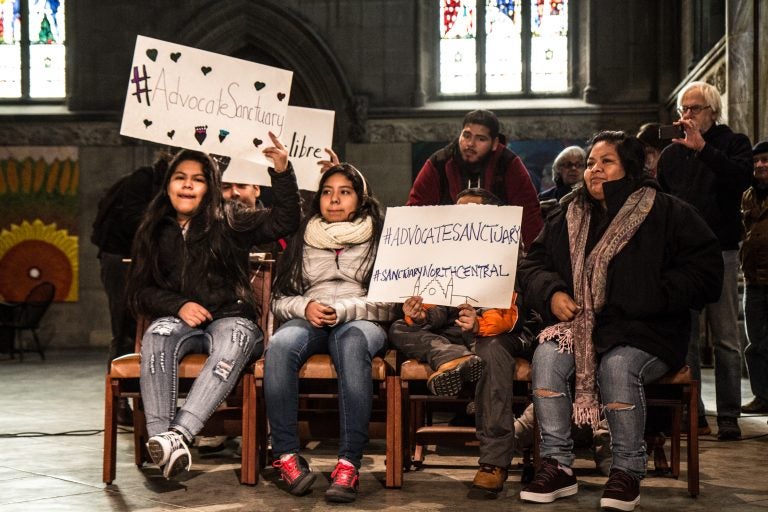Despite long odds, Brady sponsoring private bill to keep immigrant family in U.S.
'It lets ICE know that we’re paying attention here,' says U.S. Rep. Bob Brady of private bill he's sponsoring.
Listen 2:32
Carmela Hernandez and her family, taking sanctuary from deportation in a North Philadelphia church, ask for support on social media. (Kimberly Paynter/WHYY)
This week, U.S. Rep. Bob Brady said he will sponsor a special kind of legislation — a private bill — on behalf of one family of undocumented immigrants living in Philadelphia.
This type of measure has been used as a last resort to give immigrants in extraordinary circumstances legal status in the U.S. in the past, but changes to U.S. Immigration and Customs Enforcement’s approach to these bills has lengthened their already long odds of passing.
Carmela Apolonio Hernandez and her four children, ages 9 to 15, came to the U.S. from the Mexican state of Guerrero in 2015. Drug traffickers killed some of Hernandez’s family members, and she said she faced threats, so the family applied for asylum at a port of entry in San Diego.
Brady said Hernandez’s plight moved him to sponsor such a bill.
“If I found out that they got deported, and a month or two from now I found out some harm came to them, and I didn’t do anything, that’s not a good feeling,” said the Philadelphia Democrat.
U.S. immigration officials denied the family’s claim and a subsequent appeal. Ordered to buy one-way tickets to Mexico, Hernandez and her children moved into Church of the Advocate in North Philadelphia in December. Federal immigration officers generally avoid making arrests in certain sensitive locations, including churches, providing the family a temporary respite from deportation.
Boxed in, the family has few avenues to staying in the country legally. Private bills must go through all the same hoops as a regular, public bill, making them an especially unlikely vehicle for relief under a president who has dramatically expanded immigration enforcement.
“Many elected officials have said, ‘Well it’s never going to pass, it’s a Republican-dominated Congress, and the president will never sign it, so why bother?’ ” said David Bennion, an immigration attorney representing the Hernandez family. He said the legislation is as much about drawing attention to particular omissions in immigration law as it is about getting help in a particular case. Bennion said he also approached Democratic Sens. Cory Booker of New Jersey and Bob Casey of Pennsylvania about sponsoring legislation for Hernandez and her children.
With enough of these bills in Congress, “the hope is that it could lead to broader remedies,” in effect triggering changes to underlying immigration law by drawing attention to the plight of individuals currently left out, he said.
The success of this tactic, always a long shot, appears to be getting more elusive. Congress did not pass any of the several immigration overhaul packages discussed in the last legislative session. Between 1986 and 2013, only 170 private bills became law, according to the Congressional Research Service. More than half, like Brady’s bill, focused on getting lawful permanent residency for an immigrant otherwise headed for deportation.
Last year, ICE also signaled it would no longer voluntarily halt a deportation because it was the subject of a private bill. Acting director of U.S. Immigration and Customs Enforcement Tom Homan announced in a policy memo that only a written letter “on committee letterhead” from the chair of the Judiciary Committee in either house could move the agency to change course.
“This is a way of pushing back against Congress’ constitutional right of oversight and of ability to direct immigration enforcement agencies,” said William Stock, an immigration attorney and former president of the American Immigration Lawyers Association.
As a result, ICE in January deported Jordanian Amer Adi Othman who had been living in Ohio, in spite of a private bill sponsored by U.S. Rep. Tim Murphy on his behalf.
Brady said, given this context, he is not optimistic that his bill will have the desired effect — but it still sends a message.
“What it does, if you get enough signatures [from co-sponsors], it lets ICE know that we’re paying attention here,” he said.
WHYY is your source for fact-based, in-depth journalism and information. As a nonprofit organization, we rely on financial support from readers like you. Please give today.




